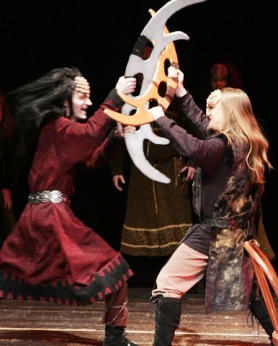Spoiler Alert: This has little to do with ethics. Think of it as a little Christmas cracker.
In the beginning… there was Charles Dickens classic tale of greed, redemption and compassion. In short order, Dickens, or rather Hollywood, begat Once Upon a Christmas, Twice Upon a Christmas, White Christmas, A Christmas Story, Christmas Vacation, A Charlie Brown Christmas (my favorite), How the Grinch Stole… and the list goes on.

Now, something new for Holiday theatergoers, A Klingon Christmas Carol.
That’s right, space boys and space girls, the Dickens classic has been adapted (and adopted) by those wolf-like war lords of the Trekkie universe, the malevolent Klingons. For those of younot fluent in the Klingon tongue, the title of this commentary is pronounced, “Bakka, Teem chome”; English translation, “Humbug, Tiny Tim!”
(Sidebar: Klingons were the big, dark, brutish, warlike characters on Star Trek, the TV space opera of the 60s.)
This week in a Chicago theater, seventeen actors with latex ridges glued to their foreheads run around for one hour, 20 minutes in what can only be described as a new milestone in acting – the entire production is spoken in Klingon! (I’d like to see Meryl Streep tackle this dialect!) Those of us unfamiliar with the language can look at the overhead screen that displays the English translation.
“In 1984,” the Wall Street Journal reports, “producers of Star Trek III: The Search for Spock, incorporated Klingons into the screenplay and asked Marc Okrand, a linguist with an expertise in Native American languages, to create dialogue for the movie. Mr. Okrand created a 2000-word language that could be expanded by compounding words.
“A Klingon Christmas Carol, follows the familiar Dickens script: An old miser is visited on a hallowed night by three ghosts who shepherd him through a voyage of self-discovery. The narrative has been rejiggered to match the Klingon world view. For starters, since there is neither a messiah nor a celebration of his birth on the Klingon planet of Kronos, the action is pegged to the Klingon Feast of the Long Night. Carols and trees are replaced with drinking, fighting and mating rituals. And because Klingons are more concerned with bravery than kindness, the main character’s quest is for courage.”
One question: Since Dickens’ Scrooge is already painted as beyond petty, irascible and mean, just how much meaner can Klingon Scrooge be, short of threatening to eat timHom?
“Mr. Okrand,” the Journal writes, “thought the Klingon dictionary, published as part of the marketing campaign, was little more than an oddity that might find its way to the attics of a few Star Trek fans. Wrong: It has been through more than 20 reprints and sold over 300,000 copies.”
Of course, the Dickens classic is just another benchmark in Klingon culture according to (Are you sitting down?) The Klingon Language Institute founded in 1992 in Blue Bell, Pennsylvania.
“Outsiders think it’s weird,” says Lawrence Schoen, founder and director of the KLI. “But it’s no different than walking into a sports bar where everyone knows the score of the third game of the 1982 World Series.”
Who knew there were that many Klingon bars in Blue Bell!
However, the Klingon version alters Tiny Tim’s iconic final line from “God bless us, everyone!” to “We are Klingons!” Mr. Okrand clapped exuberantly. (I’m getting the chills.)
So, what’s next for the mighty Klingon players, Shakespeare’sHamlet? Been there, done that.
Alone on stage, young Khamlet quietly ponders, “taH pagh taHbe” – “To be or not to be.”
Comments









